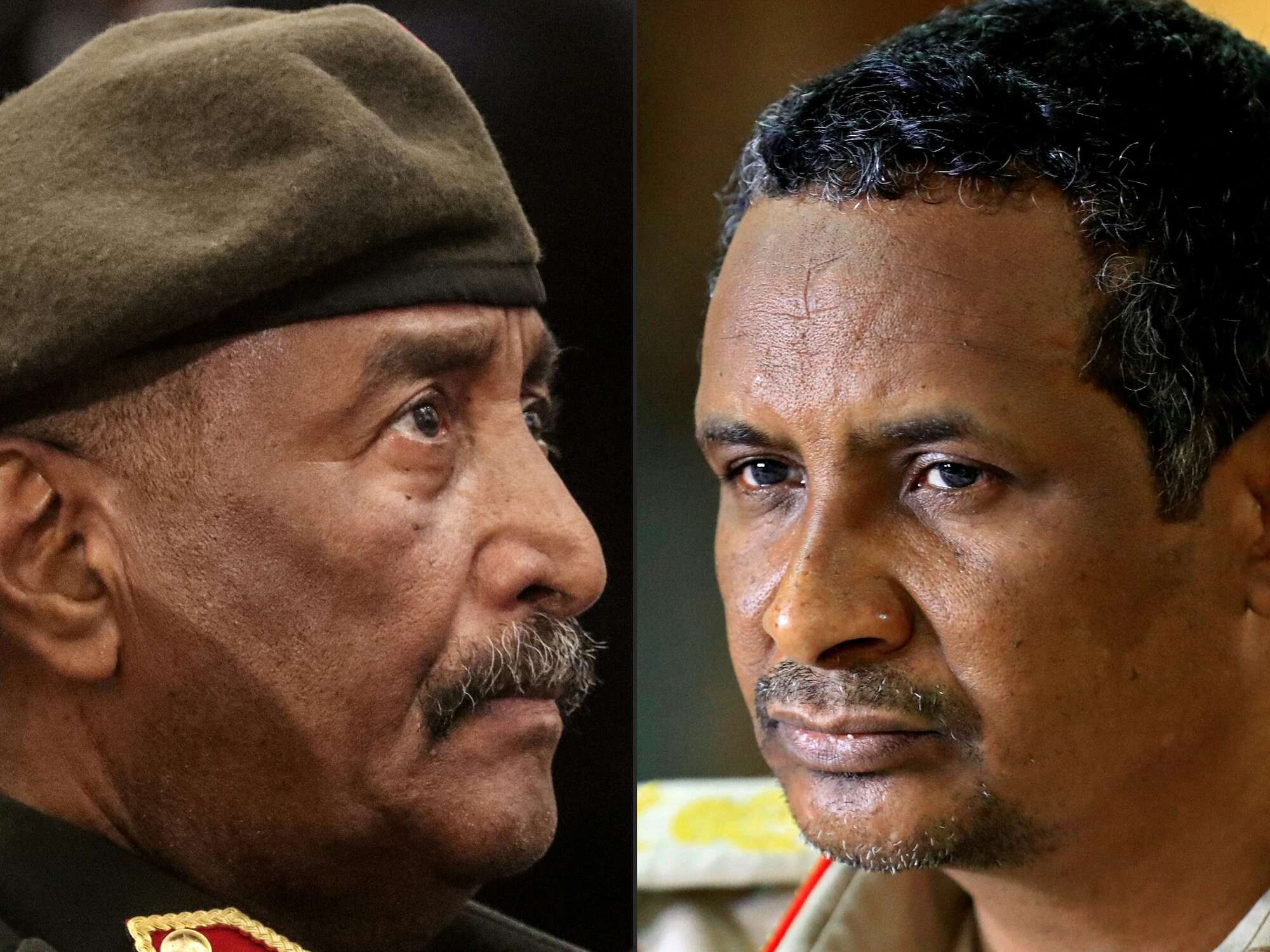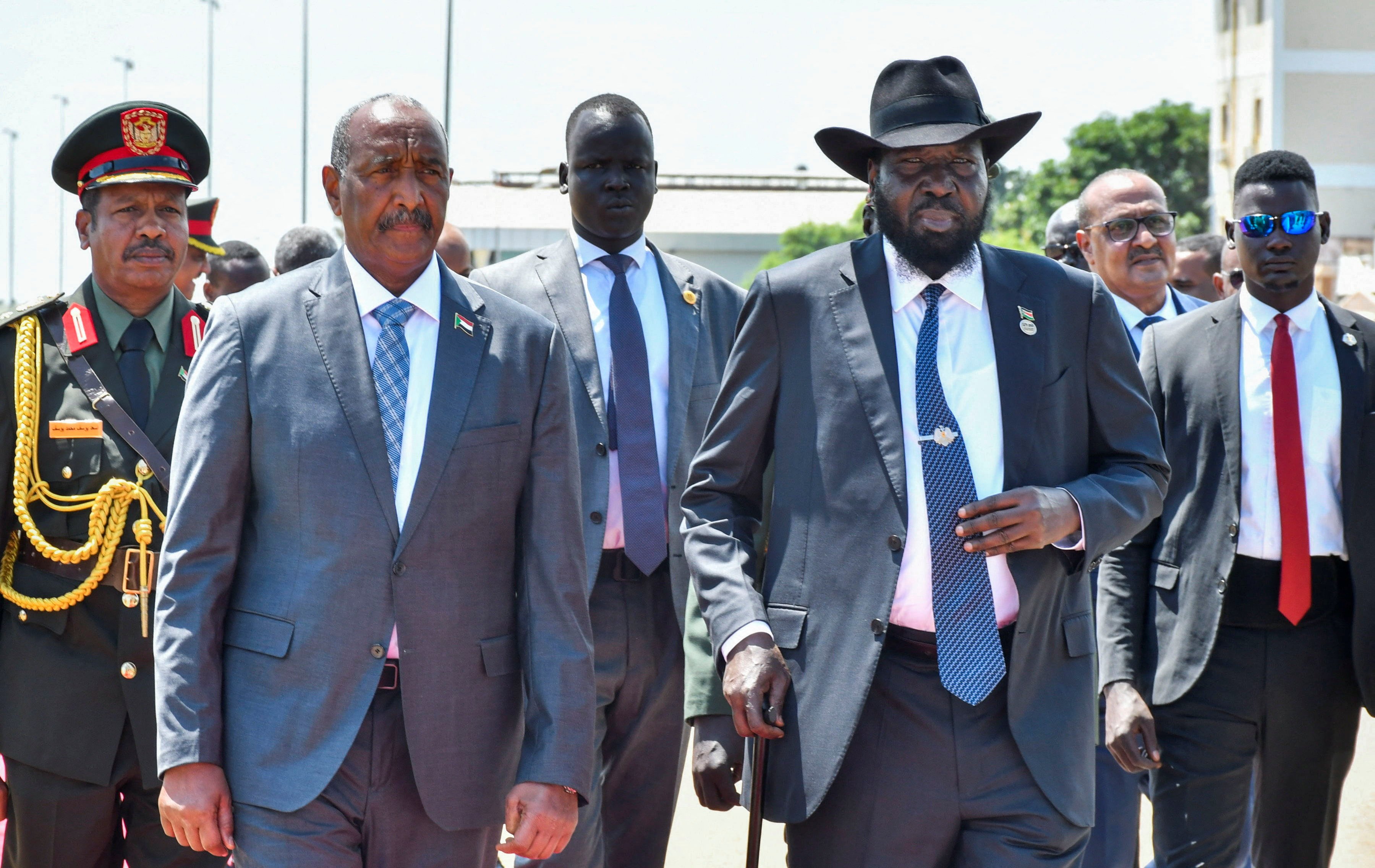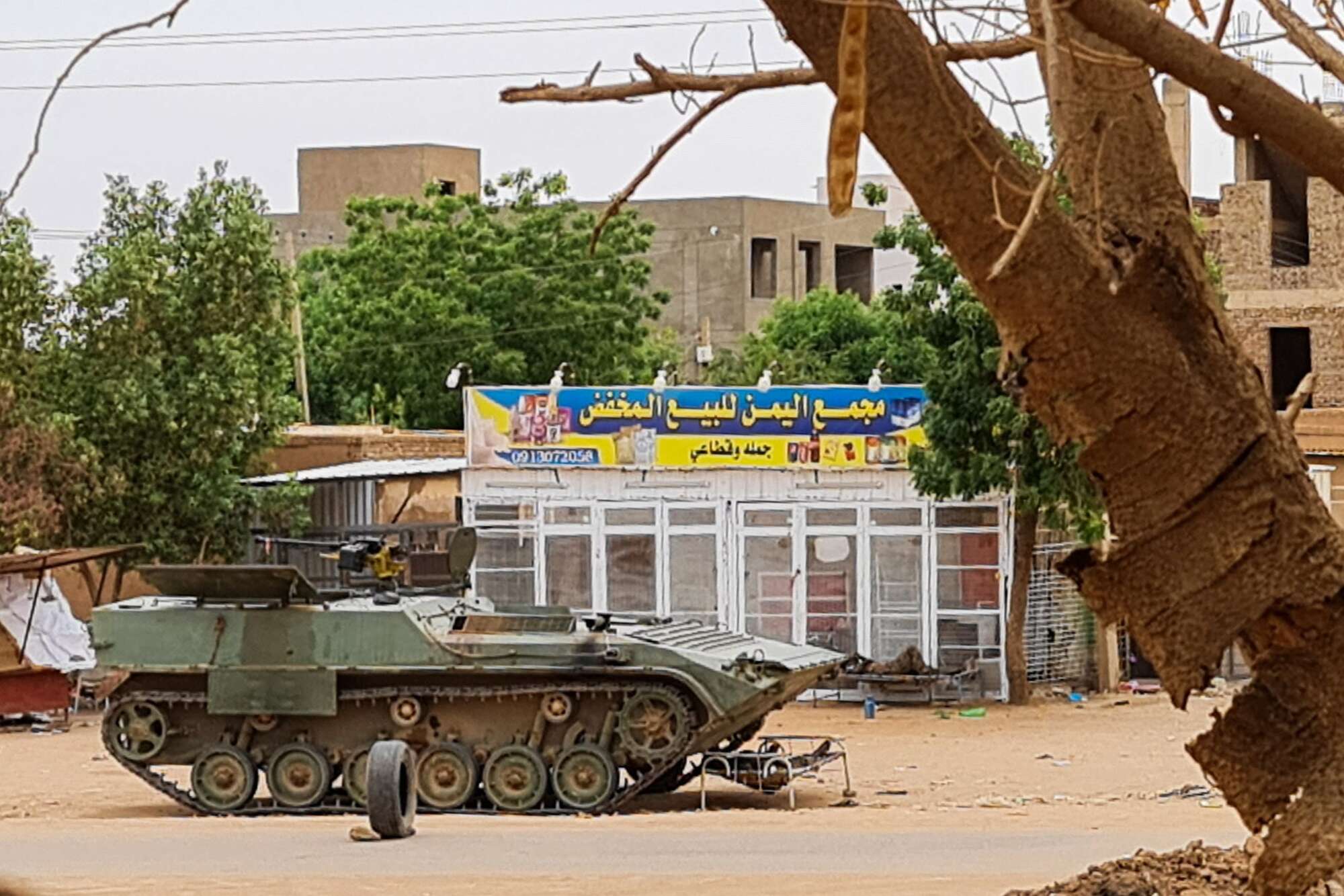
Uganda's president, Gen (rtd) Yoweri Museveni (L) shakes hands with Sudanese paramilitary Rapid Support Forces (RSF) chief, Gen Mohamed Hamdan Daglo during their meeting dat the former's home in Rwakitura in western Uganda on December 27, 2023. PHOTO/ PPU
President Museveni is on Wednesday expected to convene the high-level summit aimed at charting a peace path to ending the 17-month war in Sudan, Foreign Affairs minister Gen Jeje Odongo has said.
Uganda, Gen Odongo told this year’s Uganda Council on Foreign Relations (UCFR) symposium in Kampala, will hold the meeting “as the appointed chair of the committee of five” of the 15 member country African Union Peace and Security Council (PSC).
The summit will be attended by heads of state or representatives of the committee of five member states, including Egypt, Nigeria, Equatorial Guinea, and Angola. Representatives of the African Union, Intergovernmental Authority on Development (Igad), and League of Arab States are also expected to attend.
Uganda as the committee chair, Gen Odongo revealed, “Has been at the forefront of mediating in the conflict in Sudan.”
Since late 2023, President Museveni has met various delegations of the warring parties in Khartoum and implored them on dialogue and ceasefire.
Diplomatic sources told Sunday Monitor separately that the President first called the “extra-ordinary summit” during the PSC Heads of State meeting on June 21 to chart a way forward to ending the conflict. The meeting, sources further revealed, was delayed pending consultation “on a suitable date”.
The North African country was plunged into anarchy following the ouster of strongman Omar al-Bashir from power in 2019. Then came divisions within the armed forces, degenerating into conflict starting April 2023 between the Sudanese Armed Forces (SAF) and the ragtag outfit Rapid Support Forces (RSF).
The conflict, exacerbated by the two decades of civil war in the country’s western Darfur region, has triggered a catastrophic humanitarian crisis.
As of September 16, according to the UN Security Council, the conflict has claimed more than 23,015 people and displaced approximately 10.5 million people, 2.2 million of whom have sought refuge in Sudan’s neighbouring countries—the Central African Republic (CAR), Chad, Egypt, Ethiopia, Libya, South Sudan, and Uganda—“making it the world’s largest displacement crisis”.
According to the UN refugee agency, UNHCR, refugees from Sudan comprise a large group of new arrivals in Uganda.
Amid the raging conflict in Khartoum is the mounting tensions between the country’s neighbours, Egypt and Ethiopia that have long sparred over the River Nile waters. The United Arab Emirates in the Middle East is particularly accused of fanning flames by supplying weapons and equipment to the RSF.
The scorecard
Several pundits have pointed out the Sudan crisis as a classic example of what could possibly go wrong in countries where leaders do not want to hand over power democratically and political transitions are not prepared adequately.
However, during the UCFR symposium on Tuesday under the theme ‘To Address and Interact with Stakeholders on the Status of Uganda’s Foreign Policy; Outlining Opportunities and Challenges’, Gen Odongo waxed lyrical about foreign policy achievements, including mediating the Sudan conflict, under President Museveni as monumental.
It was a report card the holder proudly waved but some attendees, in this case ordinary Ugandans attending the symposium, expressed immediate misgivings, citing numerous incidents of diplomatic meltdown at key Uganda missions abroad, from Washington DC, Ottawa, Dubai, and Abuja.
“At the heart of Uganda’s foreign policy in the region are issues of regional peace and security, fight against terrorism, regional integration and connectivity as well as regional trade and business,” Gen Odongo said.
This, he said, is the basis for relations with neighbouring countries and regional organisations. At the bilateral level, Uganda enjoys “excellent relations with Tanzania, Rwanda, Kenya, South Sudan, Burundi, and DR Congo, Sudan, Eritrea, and Ethiopia with existing frameworks of cooperation in many areas, including political cooperation, sectoral partnerships and cooperation, most of which have diplomatic representations in Kampala, and Uganda has got diplomatic representation in their capitals”.
“Occasionally, a few challenges emerge in the relations between Uganda and these neighbouring countries, notably trade policy disagreements, protectionism and a few border demarcation disputes. Even then, we have available mechanisms of engagement and when these issues have arisen, we have amicably addressed and resolved them without any difficulties,” he added.
Case in point was the breakdown in relations with Kigali between 2019 and 2021, with the latter accusing Kampala of, among others, harassing its nationals. Kampala had pointed an accusing finger at Kigali for mainly operating espionage rings within its boundaries. A potential tinderbox, this dispute was resolved through shuttle diplomacy involving several actors.
Besides attempting to mediate the conflict in Khartoum, the Kampala regime has also been a guarantor of the peace initiative in South Sudan under the Luanda and Nairobi processes, in Burundi, and involved in the pacification of the restive eastern Democratic Republic of the Congo (DRC).
Kampala proudly claims that such interventions over the years helped stop pogroms in Rwanda, established a more stable and progressive government in the DRC, stemmed likely genocide in South Sudan and is now holding Somalia together.
On the other hand, some critics argue that this is merely an art form by the government, in power for nearly 40 years, to remain relevant to the United States, which provides nearly $1 billion annually in funding for health, security cooperation, and promotion of good governance, and to the European Union across the Atlantic.
Arising out regional security issues, Gen Odongo said Uganda has kept its borders open for all those fleeing from any form of persecution.
“The cardinal principle behind this open refugee policy is HE the President’s view that Uganda should open her doors to African people who are in distress, and this has become a pillar of our foreign policy. The cost of hosting refugees is enormous. It takes a heavy toll on available services for the nationals, and stretches the meagre government resources,” he said, adding, “However, with the help of international partners, this burden has been reduced, and refugees have been able to live a safer and better life compared to the situations they have been forced to flee from.”
Hits and misses
Uganda currently hosts the largest refugee population in Africa, set to hit two million by the end of the year on account of new arrivals from the DRC and Sudan. However, the government’s multi-sectoral refugee response is currently grappling with dwindling financial resources occasioned by among others, global competing priorities such as Ukraine and the Middle East and the rise and rise of right-wing governments in traditional donor countries.
Still, there are muffled voices that the government seems preoccupied with capturing the attention of the rest of the world with its open-door policy for political capital while turning a blind eye to the plight of its own citizens. The refugee hosting districts to the north and south western have some of the highest poverty levels and poor service delivery levels, and it’s not uncommon to hear locals complain that refugees are well taken-of.
Over the years, the government’s human rights record and institutionalised corruption have become disablers overall for financing refugee interventions. In June 2017, the government convened the refugee summit to raise $2 billion (Shs7.3 trillion) only to bring in pledges that were short by $1.6 billion.
On the international level, the country’s profile was amplified early this year with the hosting of the back-to-back Non-Aligned Movement (NAM) and G77+China summits in Kampala. Kampala currently chairs NAM with a membership of 121 countries until 2026, and G77+China with 134 member states, until next January.
As the G77+China chair, Uganda last month rallied the alliance to negotiate and rally adoption of the ‘Summit of the Future’ pact aimed at bolstering multilateralism and charting a blueprint for tackling existential threats ranging from climate change to AI-driven technological apocalypse.
UN secretary general António Guterres on October 4 commended President Museveni and Uganda’s Permanent Representative to the UN Adonia Ayebare during the steering of the Summit of the Future and the resultant pact.
“Uganda has long been a highly valued partner of the United Nations and your continued cooperation in addressing global challenges is greatly appreciated. Be assured that the UN remains fully committed to further strengthening our partnerships in the years ahead,” Mr Guterres wrote.
Amid such pleasant coating regionally and internationally, the execution of the country’s foreign policy has been hamstrung by a cocktail of challenges. This includes insufficient funding that has impeded among others remuneration of staff and constipated work plans such as promoting the country to attract Foreign Direct Investments.
Add to the mix, the continued turning of the once coveted Foreign Service into a dumping ground for election losers and loyal cadres—the problem compounded by widespread nepotism and cronyism— which means there is hardly any room for promotion of both career and parachuted staff.




